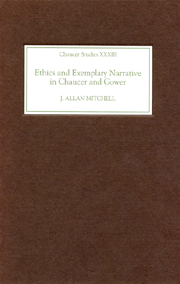Book contents
- Frontmatter
- Contents
- Acknowledgements
- Abbreviations
- Introduction
- 1 Reading for the Moral: Controversies and Trajectories
- 2 Rhetorical Reason: Cases, Conscience, and Circumstances
- 3 Gower For Example: Confessio Amantis and the Measure of the Case
- 4 All That Is Written For Our Doctrine: Proof, Remembrance, Conscience
- 5 Moral Chaucer: Ethics of Exemplarity in the Canterbury Tales
- 6 Pointing the Moral: The Friar, Summoner, and Pardoner's Satire
- 7 Griselda and the Question of Ethical Monstrosity
- Conclusion
- Bibliography
- Index
- CHAUCER STUDIES
6 - Pointing the Moral: The Friar, Summoner, and Pardoner's Satire
Published online by Cambridge University Press: 12 September 2012
- Frontmatter
- Contents
- Acknowledgements
- Abbreviations
- Introduction
- 1 Reading for the Moral: Controversies and Trajectories
- 2 Rhetorical Reason: Cases, Conscience, and Circumstances
- 3 Gower For Example: Confessio Amantis and the Measure of the Case
- 4 All That Is Written For Our Doctrine: Proof, Remembrance, Conscience
- 5 Moral Chaucer: Ethics of Exemplarity in the Canterbury Tales
- 6 Pointing the Moral: The Friar, Summoner, and Pardoner's Satire
- 7 Griselda and the Question of Ethical Monstrosity
- Conclusion
- Bibliography
- Index
- CHAUCER STUDIES
Summary
In his monumental study of preaching in the later Middle Ages, G. R. Owst argued that vernacular literary tradition effectively contracted the “germs” of literary realism, satire, and social consciousness from the pulpit. In a later chapter of his Literature and Pulpit in Medieval England, entitled “Fiction and Instruction in the Sermon Exempla,” Owst was able to show that English poetry and drama were profoundly shaped by the pulpit rhetoric: travelogue, classical pagan tales, animal fables, ribald and satirical matter (anticlerical, antimatrimonial, antifeminist) all have precedents in sermon exempla. Historians since have gone on to corroborate and refine his thesis, and the evidence has for a long time been mounting with regard to the genesis of Chaucer's poetry. In “Chaucer and the Hand that Fed Him,” Robert Pratt establishes Chaucer's indebtedness to a popular thirteenth-century mendicant preaching manual attributed to the Franciscan John of Wales. And in several studies Siegfried Wenzel has drawn attention to the origins of Chaucer's story plots, imagery, and lexicon in contemporary preaching.
So the genuinely “popular” exemplary matter of homiletic discourse is discoverable in Chaucer's poetry, and as always the question to ask is to what purposes the poet has assimilated it to his fiction. It is commonly thought that exempla exist in Chaucer for the purpose of satire. Granted, but we need to ask to what end satire is applied, for satire is not Chaucer's original contribution; anticlerical satire, for instance, is found in sermons themselves.
- Type
- Chapter
- Information
- Ethics and Exemplary Narrative in Chaucer and Gower , pp. 94 - 115Publisher: Boydell & BrewerPrint publication year: 2004



